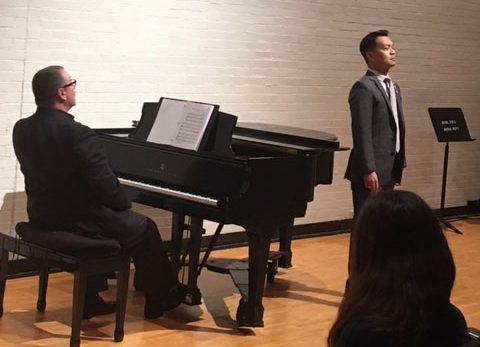On Sunday, Nov. 11, the Muhlenberg College Music Department held a performance titled “In Remembrance: A Concert for the 100th Anniversary of the Armistice” in the Recital Hall. The small venue rapidly filled with students, faculty and community members alike. As people filed in, quiet murmuring buzzed through the air. An isolated piano was centrally positioned, with a music stand and audio equipment crowded into the far right corner of the stage.
“Thank you for joining us in remembering heroes who fought and died for this country,” Vincent Trovato, the Staff Accompanist for the Muhlenberg College Music Department, said as he warmly greeted the audience. After a few more brief remarks, the first musician, Ashley Hiester ‘19, rose from the audience to play “Menuet” from Tombeau de Couperin by Maurice Ravel on the piano. Hiester’s body flowed with her fingers across the keys, playing a light song which danced through the air as she slightly swayed on the piano bench. Hiester’s piece progressed into somber, richer tones midway through, but quickly returned to its prior dainty sound. At the conclusion of her piece, Hiester was met with applause, and, as she smiled, she took a deep bow.
The next performer was the baritone vocalist instructor Brian Chu, with a very impressive performance background. Chu was accompanied by Trovato and performed Six Songs from a Shropshire Lad by George Butterworth. After Chu concluded the first of the six songs, a spattering of applause flitted through the audience until Chu, leaning against the piano with a composed expression, signaled for Trovato to continue with the next piece. Chu’s deep baritone was full of a rich vibrato which filled up the entire hall. He was passionate in his performance, with both agony and joy etched onto his face during various songs, his hands gesturing dramatically. The audience showed their appreciation for Chu’s performance with thunderous applause, which Chu directed towards Trovato with a sweeping gesture.
Music lecturer Dr. Darin Lewis performed two pieces by Claude Debussy, “Elégie” and “Berceuse Héroïque.” Both songs had a calming, yet foreboding melody. Lewis’s hands carefully moved across the keys as his wrists rose and fell in soft motions. Alexandra Porter, a soprano and an adjunct voice instructor, was very expressive during her performance, using body movement and facial expressions to convey the painful feeling of the two songs. Her lips trembled with passion, her hands were tightly clenched and her eyes gazed upwards toward the control booth. Porter was accompanied by Trovato on the piano.
Performing “Willie Has Gone to War” by Stephen Foster and the entertaining “Oh, How I Hate To Get Up in the Morning” by Irving Berlin, mezzo-soprano and private voice instructor Maja Lisa Fritzhuspen put on quite a performance. With Trovato on the piano, Fritzhuspen performed her first piece so passionately that it felt as if she had personally known “Willie” and was lamenting his absence. The second song opposed the first — it was a jaunty tune, and, at the end of the song, a man in uniform playing the bugle wandered onto the stage and Fritzhuspen stormed towards him jokingly wrapping her fingers around the man’s neck until his head drooped.
Ralph Brodt, an artist-lecturer of trombone and low brass — and the man who was just mock-strangled — played “I Vow to Thee My Country” by Gustav Holst on the trombone, backed by an electronic ensemble. As Brodt played the last note, his face became flushed with concentration and exertion. A highlight of the concert was the second to last piece, “Over There” by George Cohan, where the audience was invited to sing along with all of the evenings’ performers, accompanied by Lewis and Trovato on the piano. The words to the song were printed in the program book, and the majority of the audience joined in, their voices intermingling with the performers’.
The concert ended with Brodt playing “The Last Post,” a British military call, to honor and remember those who lost their lives in war.






















